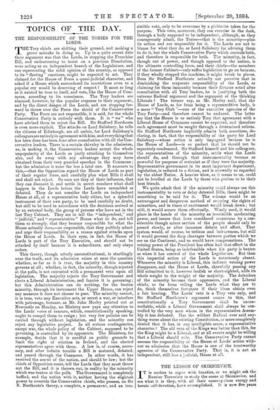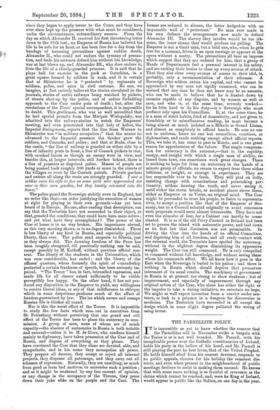THE LESSON OF SKIRNIEVICE.
IT is useless to argue with fanatics, or we might ask the Russiar Terrorists to study the scene at Skirnievice, and see what it is they, with all their unscrupulous energy and heroic self-devotion, have accomplished. It is now five years since they began to apply terror to the Czars, and they have ever since kept up the pressure with what must be considered, under the circumstances, extraordinary success. From the day on which Alexander II. received his first threatening letter down to the 16th inst., no Emperor-of Russia has believed his life to be safe for an hour, or has been free for a day from the bondage of harassing precautions against sudden death. Alexander II., who could not endure the tyranny of precau- tion, and bade his servants defend him without his knowledge, was at last blown up, and Alexander III., who does endure it, lives the life of a closely-guarded prisoner. It is said that he .plays ball for exercise in the park at Gatschina, in a great square formed by soldiers in rank, and it is certain that at Skirnievice he is "protected " by regiments of soldiers, police, and spies in civil costume. No one, we imagine, at first entirely believed the stories circulated in the journals, stories of entire railways being watched by pickets, of streets shut-up by the police, and of orders forbidding approach to the Czar under pain of death ; but, after the revelations of the Times' special correspondent, it is impossible to doubt. This gentleman, who was so well accredited that he had special permits from the Marquis Wielopolsky, was admitted into the railway-station to watch the Emperors' meeting, and even penetrated into that holy of holies, the Imperial dining-room, reports that the line from Warsaw to Skirnievice was "in military occupation ;" that the nearer he advanced to the Imperial presence the thicker grew the soldiers, and Cossacks, and police ; and that at Ruda, close to the castle, "the line of railway is guarded on either side by a line of infantry posts in front, a line of Cossack pickets in rear, with couched lances as though an enemy were in view, and besides this, at longer intervals, still further behind, there is a line of peasants or disguised police. Masses of people are being pushed back roughly 300 yards or more in the streets of the villages en route by the Cossack patrols. Private gardens and entries all along the route are strongly guarded. I saw a soldier raise his rifle to fire on some girls who approached too near in their own garden, but they hastily retreated into the house."
The police guard the Sovereign strictly even in England, but no order like that—an order justifying the execution of women at sight for playing in their own grounds—has yet been heard of in Europe. No one, after reading that description, can say that the Terrorists have not succeeded in their object, or that, granted the conditions, they could have been more active ; and yet what have they accomplished ? The power of the Czar at home is in no way broken. His importance abroad, as this very meeting shows, is in no degree diminished. There is less liberty of any kind in Russia, and especially political liberty, than ever. The police send suspects to Siberia, just as they always did. The dawning freedom of the Press has been roughly abrogated, till practically nothing can be said, except possibly by M. Katkoff, without previous official con- sent. The liberty of the students in the Universities, which was once considerable, has ended ; and the liberty of the officers' quarters, where formerly the spirit of comradeship protected a certain frankness of speech, has been seriously im- paired. "The Terror" has, in fact, intensified repression, and made life for all classes raised sufficiently to be visible perceptibly less happy. On the other hand, it has not pro- duced any disposition in the Emperor to yield, any willingness to receive liberal ideas, or any of that indifference to obloquy which in some despotisms produces mach of the effect of freedom guaranteed by law. The ice which covers and cramps Russian life is thicker all round.
Nor is this the worst effect of the Terror. It is impossible to study the few facts which ooze out in narratives from St. Petersburg without perceiving that one grand and evil effect of the Terror has been to place the autocracy in com- mission. A group of men, none of whom are of much capacity—the absence of eminencies in Russia is both notable and unusual—unless it be M. de Giers, who confines himself mainly to diplomacy, have taken possession of the Czar and of Russia, and dispose .of everything as they please. They have convinced the Czar that they alone are devoted, able, and sympathetic, and in his name they monopolise all power. They prepare all decrees, they accept or reject all internal projects, they dispense all patronage, and they carry out all schemes of repression. Naturally, they are unwilling, as much from good as from bad motives, to surrender such a position ; and as it might be weakened by any free current of opinion, or any change in the occupancy of the Throne, they press down their yoke alike on the people and the Czar. The former are reduced to silence, the latter hedged-in with an impassable wall of "protectors." No man ever made in his own defence the arrangements now made to defend Alexander III. The slavery they involve would be too irk- some, the inner shame they would produce too galling. The Emperor is not a timid man, but a bold one, who, when he gets free for a moment, drives in an open carriage or appears at the opera without a sentry. The precautions all bear an impress which suggest that they are ordered for him, that a group of Heads of Departments feel a personal interest in his safety, and are racking their brains to close up every avenue of attack. That they also close every avenue of access to their idol, is, probably, only a recommendation of their schemes. A Sovereign who seldom enters his capital, and who cannot be approached by any man not rigidly examined, who can be warned that any man he does not know may be an assassin, who can be made to believe that he is hunted down by enemies capable of any disguise, and by women as well as men, and who is, at the same time, severely worked— for he tries hard to do his duty—is a Sovereign who must perforce rely upon his Councillors. If, at the same time, he is a man of strict habits, fond of domesticity, and not given to friendship or to miscellaneous reading, he must become a being almost as much isolated as a Mikado or Grand Llama, and almost as completely in official hands. He sees no one not in uniform, hears no one but councillors, courtiers, or diplomatists, and reads nothing except sifted official reports. This, we take it, has come to pass in Russia, and is one great reason for apprehension of the future. The single compensa- tion for autocracy is the autocrat,—that is, the rapidity, energy, and insight with which a single man of ability, re- leased from laws, can sometimes work great changes. There is nothing to hope for from an autocracy in the hands of a minute group of officials, no reason to expect from them either loftiness, or insight, or courage in experiment. They are too responsible ever to be fresh. They will plod on dully, resisting change with conscientious and painstaking per- tinacity, seldom hearing the truth, and never seeing it, until either the storm breaks, or accident places above them, either as Emperor or as Vizier, an original mind. The Czar might be persuaded to trust his people, to listen to representa- tives, to accept a position like that of the Emperor of Ger- many, but to a Council selected originally to avoid concession such proposals would seem almost treasonable. They have not even the stimulus of fear, for a Cabinet can hardly be assas- sinated. It is as if the old Privy Council in Ireland had been set to govern the island with autocratic power, and laid down as its first law that discussion was not permissible. In driving the Czar into the hands of an official Committee, and depriving him of all freedom, and all ready contact with the external world, the Terrorists have spoiled the autocracy, without in the slightest degree diminishing its oppressive weight. The Czar can still command. He is only compelled to command without full knowledge, and without seeing those whom his commands affect. We all know how it goes in the East when the Sovereign is buried in his palace ; and there is nothing in Russia which should deprive that premature interment of its usual results. The machinery of government in Russia is at present too strong to show weakness ; but of improvement, and especially of improvement through any original action of the Czar, who alone has either the right or the impulse to take a daring initiative, we entertain no hope. We might as well expect invention from a convict under sen- tence, or look to a prisoner in a dungeon for discoveries in medicine. The Terrorists have succeeded in all except the design which in some slight degree palliated the wrong of using terror.



































 Previous page
Previous page